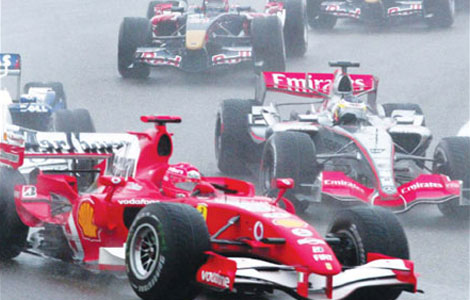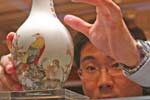Politics
Mubarak suffers heart attack in questioning
Updated: 2011-04-13 10:03
(Agencies)
CAIRO - Hosni Mubarak was in hospital after suffering heart problems under questioning, after hard-core pro-democracy protesters expressed frustration that he was being protected from prosecution by Egypt's military rulers.
The former Egyptian president fell ill on Tuesday during an inquiry into the killing of protesters in a revolution that toppled him and into corruption in his administration.
Egypt's generals, in charge since Mubarak quit on February 11, have faced increasingly loud calls from protesters in Cairo's Tahrir Square for Mubarak and his allies to stand trial.
Soldiers on Tuesday broke up a five-day sit-in at the square, which became the epicentre of the uprising in January.
There were conflicting reports about Mubarak's condition. One report said he was in intensive care after a "heart crisis" during questioning. Another said he was fit enough to be questioned in hospital in the Red Sea resort of Sharm el-Sheikh.
Mubarak, 82, was ousted after a popular uprising against repression and corruption during his 30-year rule. More than 380 people were killed in mass demonstrations that police and pro-Mubarak thugs failed to crush.
The timing of his health setback may prompt scepticism among hard-core protesters who have complained about the failure of the military to pursue Mubarak and his allies more swiftly and argue that they are protecting one of their own.
There are many in Egypt's establishment who argue the elderly leader should be able to bow out with dignity after overseeing years of stability, but protesters criticise his rule by emergency law and say he encouraged a rich and poor divide.
"We want our money. We want the thief to be tried," chanted dozens of people gathered near the hospital in the glitzy resort where Mubarak spent more and more time before leaving office.
The public prosecutor summoned Mubarak on Sunday for questioning over the killing of protesters and embezzling of public funds. His two sons, Gamal and Alaa, were also added to the list of ex-ministers and officials now under investigation.
In his first public comment since stepping down, broadcast on Al Arabiya on Sunday, Mubarak denied wrongdoing.
State television said Mubarak suffered a "heart crisis" during questioning and said he had been taken into intensive care. But Al Arabiya television quoted a hospital manager as saying that Mubarak was fit enough to be questioned.
The state-owned Al Ahram newspaper reported Mubarak had been summoned to appear in a Cairo court. Its website later said the ex-president may not now have to travel because of his illness.
A judicial source said Mubarak's two sons were questioned in South Sinai, where Sharm el-Sheikh is located. Gamal, 47, Mubarak's younger son, held a top post in the ruling party and many Egyptians believed he was being groomed for high office.
CALLS FOR SWIFT TRIAL
Mubarak has suffered from health problems in recent years and went to Germany for gall bladder surgery in March 2010. There were frequent rumours about his health as he aged, particularly after his last bout of surgery.
Mubarak had vowed to die in Egypt when he addressed the country's 80 million people shortly before he stepped down.
Hundreds of thousands of Egyptians gathered again in Tahrir on Friday for one of the biggest demonstrations since Mubarak was ousted, many of them angry at the army's failure to put Mubarak and his allies on trial swiftly.
Soldiers and police used tasers and batons to try to drive out the protesters on Friday night. In resulting clashes, medical sources said 13 men were wounded by gunfire and two died. The army denied using live ammunition.
Angry protesters demanded the army hand power to civilians, but soldiers moved in on Tuesday to end the sit-in. A Reuters photographer saw hundreds of troops in the middle of Tahrir and in military vehicles at every entrance to the normally busy thoroughfare.
Troops with machineguns rounded up several young men and pushed them into vans. Others hauled coils of barbed wire used by demonstrators, and makeshift barriers erected during the protest, onto military trucks.
By early evening traffic was flowing through Tahrir, a major junction of roads that was the focus of the protests. Many ordinary Egyptians are tired of the protests that have hammered the economy and disrupted their lives.
A youth coalition that helped organise the uprising said it had persuaded the remaining protesters to reopen Tahrir because they were doing the country no good by staying.
"We met with the (ruling) military council yesterday and discussed opening Tahrir. We agreed to end the protest and give the army a chance to proceed," said Mohamed Sukri, a member of the Revolutionary Youth Coalition.
Mohamed Zaidan, who said he belonged to no group and was in the square when the army arrived, gave a different account.
"We didn't agree with anyone to clear Tahrir," said the 25-year-old. "We were attacked by rock-throwing people who wanted to force us out and then the army came, didn't speak to us and suddenly moved in to force us out of the square."
E-paper

Green light
F1 sponsors expect lucrative returns from Shanghai pit stop
Preview of the coming issue
Toy for rich boys
Reaching out
Specials

Share your China stories!
Foreign readers are invited to share your China stories.

No more Mr. Bad Guy
Italian actor plans to smash ‘foreign devil’ myth and become the first white kungfu star made in China.

Art auctions
China accounted for 33% of global fine art sales.
